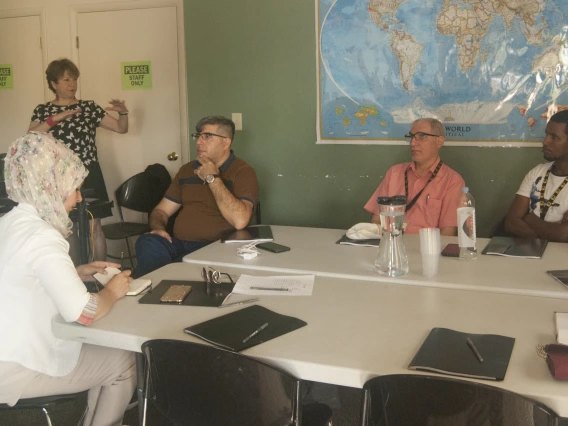
The UA's National Center for Interpretation hosted 11 International Rescue Committee staff members for an all-day, pro-bono training seminar to improve their work interpret for local refugees.
The Sept. 6 training was the third pro-bono interpreter workship NCI hosted, made possible by the generosity of the instructor, Yvette Citizen, a federally certified court interpreter and long-time instructor for the Center.
The IRC, an organization that helps resettle refugees fleeing violence or political unrest in their home countries, faces major obstacles in helping these limited- or non-English language speakers take part in even simple activities, such as going to the post office, filling a prescription or accessing public transportation. The lack of trained, qualified interpreters for these refugee populations is a constant problem, said NCI Director Sonia Colina.
While qualified Spanish interpreters are typically easy to find, interpreters in less common languages like Arabic, Somali, Nepalese, and Swahili—some of the more prominent refugee languages in Tucson—are often difficult to find. Fortunately, the IRC can take advantage of its bilingual staff, many who have resided in the U.S. long enough to learn English.
However, just being bilingual is insufficient to be a competent interpreter, and there is a pressing need for the type of terminology building and skill development activities contained in NCI’s renowned interpreter training curriculum, which consists of the following:
- An overview of the settings for community interpretation, e.g., legal, medical, mental health, education, and social service, among others.
- The role of the interpreter, including ethical parameters, standards of practice, and cultural competence.
- The techniques of sight transition, e.g., document review and restructuring.
- The techniques of consecutive interpretation, e.g., notetaking skills, chunking, and memory enhancement.
- Vocabulary development in community interpreting settings.
- Sight translation and consecutive interpreting practice using authentic scripts.
- Resources for self-improvement.
With this introductory training, potential interpreters expand their competency and ability to offer language services to the refugee community in Tucson. NCI has trained thousands of interpreters throughout the years, and looks forward to continuing this work for the IRC and other entities.

